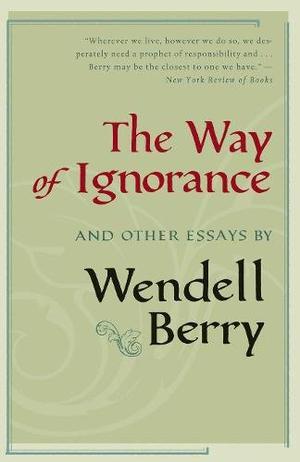
Many of the ideas we prize are dangerous and self-destructive; many of the values we profess to cherish we do not practice.
Prolific septuagenarian poet, novelist and essayist Berry (Citizenship Papers, 2003, etc.) returns with another collection of essays, most published (or delivered as speeches) in 2004. The astonishing thing about these pieces is not their lucidity and grace, not their plain profundity, but the variety of his subjects, the dimensions of his knowledge, experience, interest, passion.
A few quotes from some of the essays.
We Americans are not usually thought to be a submissive people, but of course we are. Why else would we allow our country to be destroyed? Why else would we be rewarding its destroyers? Why else would we all—by proxies we have given to greedy corporations and corrupt politicians—be participating in its destruction? Most of us are still too sane to piss in our own cistern, but we allow others to do so, and we reward them for it. We reward them so well, in fact, that those who piss in our cistern are wealthier than the rest of us.
A part of our inherent ignorance, and surely a most formidable encumbrance to those who presume to know the future, is our ignorance of the past. We know almost nothing of our history as it was actually lived. We know little of the lives even of our parents. We have forgotten almost everything that has happened to ourselves. The easy assumption that we have remembered the most important people and events and have preserved the most valuable evidence is immediately trumped by our inability to know what we have forgotten.
…[G]reat fault of their thesis. That fault is in their debasement of vocation to “job,” implying that what a worker does or where it is done does not matter so long as the worker gets paid for doing it. Their reduction of vocation to “job” leads necessarily to their further reduction of working people to “resources,” not different in kind or value from raw materials or machine parts.
The justifying assumptions of the industrial agriculture that we now have are based on a reductive science working within strictly bounded specializations. This agriculture, an agglomeration of specialties, appeared perfectly rational and salutary so long as it was assumable that efficiency and productivity were adequate standards, that husbandry was safely reducible to science and fertility to chemistry, that organisms are merely machines, that agriculture is under no obligation to nature, that it has only agricultural results, and that it can be confidently based upon “cheap” fossil fuels. The inventors of this agriculture assumed, in short, that the human will is sovereign in the universe, that the only laws are the laws of mechanics, and that the material world and its “natural resources” are without limit. These are the assumptions that, acknowledged or not, underlie the “war” by which we humans have undertaken to “conquer” nature, and which is the dominant myth of modern intellectual life.

We are now in the third year of these open posts. As the phrase “died suddenly” repeats in the mass media like a mantra, statistics for work days lost to illness and all-cause mortality mount up in heavily vaccinated nations, and more and more ugly facts about the official response to Covid spill out into public, we are entering what may well turn out to be the most difficult period of the Covid disaster — the phase in which denial rises in lockstep with the death rate, and a great many people try not to admit what has been done to them by the people and institutions they trusted. It could get ugly, folks. — Open (More Or Less) Post On Covid 120 by John Michael Greer
Ironically, the people still scared of Covid are vaccinated against it.
Overall, about three-quarters of adults say they are “not too worried” or “not at all worried” about getting Covid-19 over the holidays, and two-thirds say they are not worried about spreading the virus to people close to them, according to the new [KFF] survey.…
Democrats are about three times more likely than Republicans to say they’ve gotten the new shot or plan to do so, and they’re more than twice as likely to say they will take precautions against Covid-19 this respiratory virus season. — About three-quarters of Americans do not fear getting Covid-19 this holiday season by Deidre McPhillips, CNN